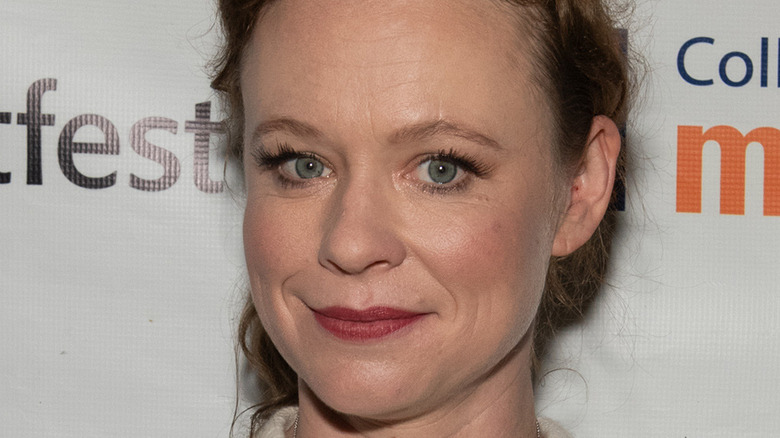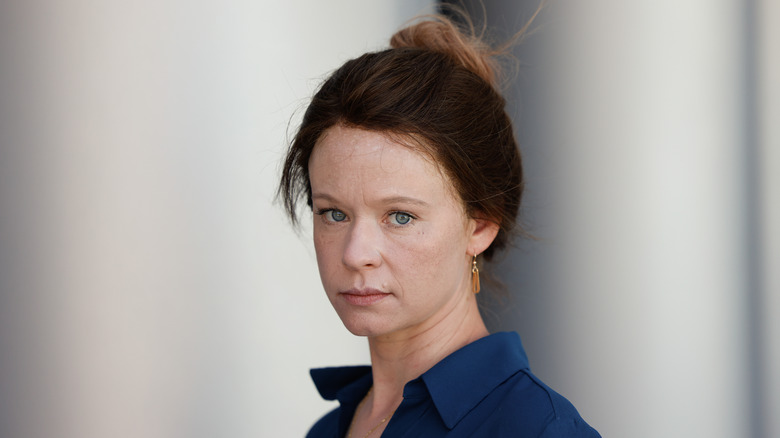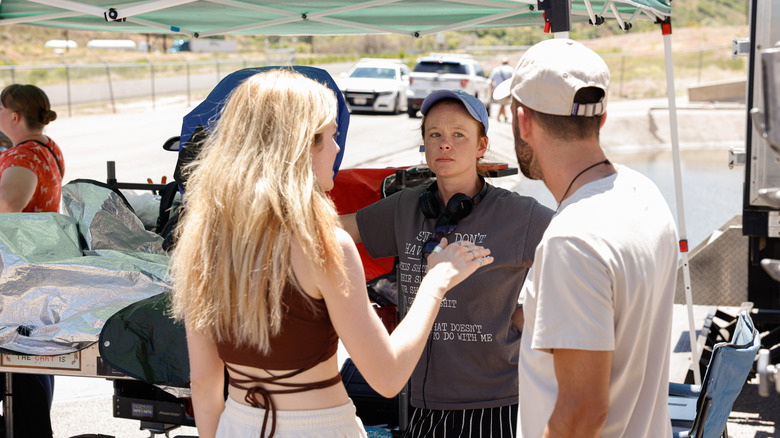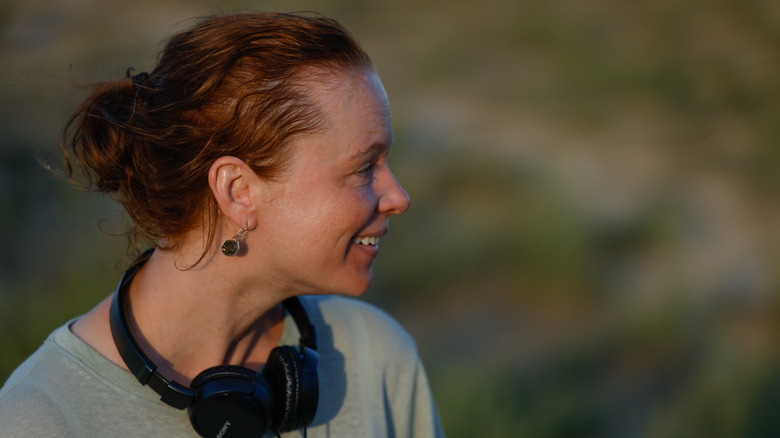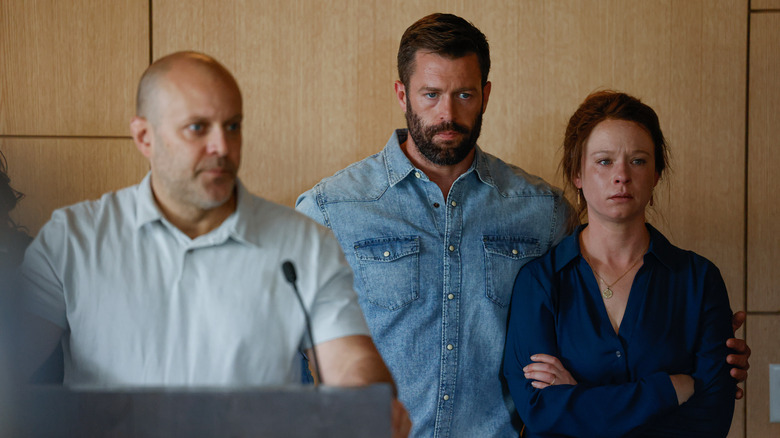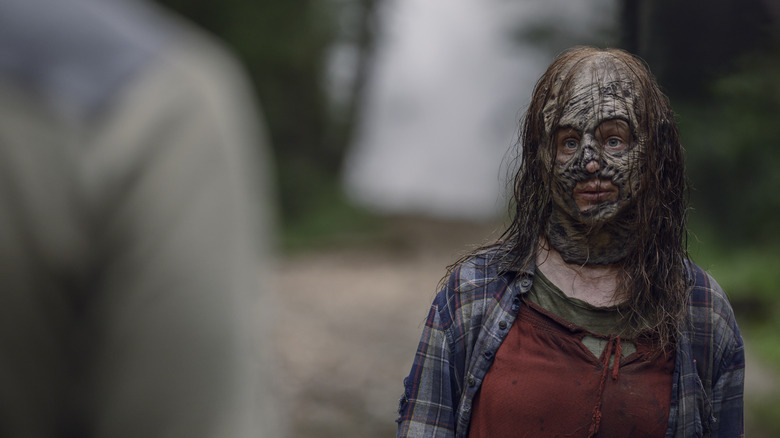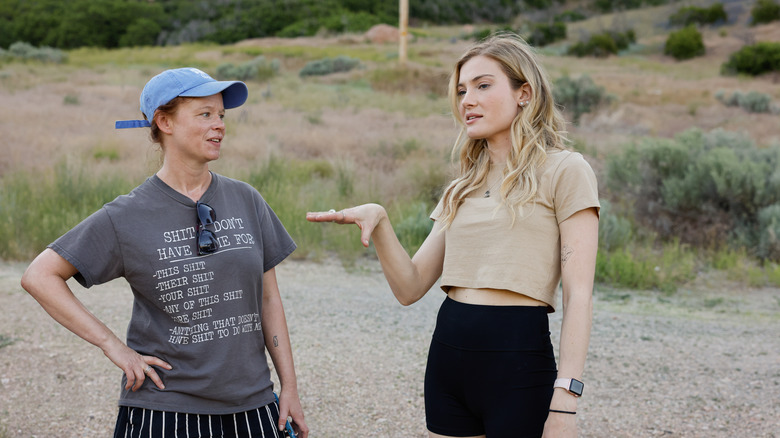Thora Birch On Her Directorial Debut With The Gabby Petito Story - Exclusive Interview
This interview contains discussions involving domestic violence.
Thora Birch made her screen debut at the tender age of four in "The Purple People Eater," a performance that paved the way for a successful career as a child actor. While still a kid, Birch starred in the series "Parenthood," and had memorable roles in such feature films as "Patriot Games," "Clear and Present Danger" (playing the daughter of Harrison Ford's Jack Ryan), "Hocus Pocus," and then, as a teenager, "American Beauty." Birch managed to successfully navigate the often-thorny transition to adult roles thanks to her acclaimed performance in 2001's "Ghost World," leading to recent roles in such TV series as "Colony," "The Walking Dead" (delivering a memorable performance as Whisperer Gamma). and Netflix's upcoming "Addams Family" spin-off, "Wednesday."
Birch recently expanded her repertoire by stepping behind the camera, making her directorial debut in "The Gabby Petito Story." The new Lifetime movie documents the tragic true story of Gabby Petito, who was murdered by her fiancé, Brian Laundrie, while traveling together on a "van life" journey throughout the U.S. The movie, fittingly, will debut on October 1, the first day of Domestic Violence Awareness Month.
In an exclusive interview with The List, Birch opened up about her experience directing the movie, what she discovered about the case, her transition from acting to directing, and much more.
If you or someone you know is dealing with domestic abuse, you can call the National Domestic Violence Hotline at 1−800−799−7233. You can also find more information, resources, and support at their website.
Thora Birch did a lot of research on the Gabby Petito case
This has been such a heavily reported, high-profile story. How aware were you of the story of Gabby Petito before you took on the project?
Actually, as it was all unfolding in real-time around this time last year, I was out of the country. Everyone from back home that I was talking to was telling me this story, but I wasn't following it. Then when I was back, I had been talking with Lifetime about their slate and the sort of stories that they were interested in. They mentioned this to me, and I did a deep dive of research — went down the rabbit hole and watched all the documentaries and did some research. I became struck by a number of elements.
Obviously, [I was interested in] their relationship and the clear distinction between the online image that Gabby was portraying about her life and her relationship and everything, and what clearly became the reality of it. [There was] also the element of the public fascination and many people's participation or desire to try to help solve the case. Then there was a human element of the idea that two young kids during COVID times were idealistically traveling the country — and as it turns out, maybe weren't the people that they should be doing that with. Exploring that in as realistic a manner as possible — given the facts we knew — was something that I thought was very intriguing, but also, I saw it as an opportunity for it to maybe be helpful as a cautionary tale.
There is that disconnect. One of the themes I saw come through was that disconnect between how people portray themselves on social media versus the reality of what their lives actually are.
Sure. That is a very common occurrence from all ages involved in social media or other online activity, which can, as we've seen, be very abusive. What was fascinating about Gabby was that she was trying to use it to offer a point of view that was very idealistic, hopeful, adventurous, and wholesome. It was an interesting strategy for a young woman of her age to take. It could be also highlighted that at least she was trying to be an inspiration to people. She wasn't on there as a hater.
Shooting on location in Utah's Moab desert was not without challenges
Shooting on location in the Moab desert is such a stunning landscape, and you filmed it beautifully. But I imagine there must have been some challenges shooting on location there.
Utah is a beautiful state, and it had a lot to offer. From time to time, it was difficult to make it seem like Florida. We cover a lot of ground in the story. The heart of it does take place in the Moab area in Utah and in Wyoming, which are right next to each other. But there were some struggles trying to find the outside of the Laundrie house [in Florida]. We had a lot of fun renting palm trees and planting them and then trying to return them.
What about the heat? Did it get quite hot when you were filming during the summer?
Right towards the tail end of it, we lucked out and had a little bit of an Indian spring, if that is a thing, but apparently, in Utah it is. We lucked out. The last week, or in a couple of days, it got a little hot, but we were fortunate to be shooting at quite a higher elevation. Thankfully, nobody passed out or anything like that.
When you're filming in the setting where events actually did take place, that certainly contributes to the realism of what you're doing. Did that also help the actors to make things more real for them when they were playing those characters?
It gave a somber perspective ... Yes, from what I gathered from my actors, they felt more connected to the people they were portraying because of the locales we were in, knowing that they had driven down these roads, and not that long ago. The gravity of the ... I don't want to call them "events." The gravity of Gabby's journey hit home for a lot of us. I know that the crew kept that in their minds as well.
Our line producer was wonderful about making sure that we had all of the wristbands, and we always had Gabby's photo up in the hair and makeup trailer and at video village. The spirit of the film was to honor her life, basically, but also to try to bring her to life so that viewers could get a stronger glimpse of who she was as much as possible that we could deduce.
Thora Birch's decades-long acting career has been like attending 'the world's best film school'
"The Gabby Petito Story" is your first time directing. Was it always the plan to get into directing at some point?
It was a desire of mine since I was about 10. It took me a while — but no, no, no. It was matter of timing and this story. I do have a long, successful relationship with Lifetime ... I give them a lot of credit for offering me this opportunity.
Since 10, you've been on a lot of sets in so many projects, worked with so many directors. I imagine if directing is something you had aspired to, you must have gone to the world's best film school in terms of your experience as an actor.
That's a great way to put it. I wish I had come up with that. It was the world's best film school, and like any great schools, there are wonderful teachers that absolutely astound you. Sometimes, you learn from the ones who aren't so good, too. But I always, as an actor — especially a younger adult actor, and into my twenties — I really, really focused on observing my directors and trying to build relationships with them.
Are there any in particular you emulate, or traits that you picked up along the way from certain directors that you thought, "This is a very good way to do this particular thing"?
I'm such a thief that I try to take from everybody. I've worked with some great ones, and I love them all. I feel like to name some versus others is a little bit politically not my gig. But like I said, I steal from everybody.
Directing is such an all-encompassing gig. There's so many aspects to keep track of. What was that like for you to basically have to keep that entire production under your eyes all the time?
I'm not going to lie. It's daunting, especially going in on your first feature. At the same time, I always view the director's role as someone who needs to understand everybody else's role. Acting since I was 4 and being on set since I was 4 gave me a good lead. But also, I believe producing two small independent films before this one gave me more of a perspective of ... There's a lot of different types of directors in how they approach their role. I always think that a director has to think [like] a producer as well to keep a harmonious balance on set.
It would be fun to spend a lot of time and experiment and go crazy like they did back in the day. I would love that, but that's not how things are made these days. It's being cognizant of that while also keeping an eye on the end goal creatively. I feel blessed with this one to have had two incredible leads. I couldn't have asked for a better Gabby and Brian — Evan [Hall] and Skyler [Samuels] were great people, but also very intelligent and talented actors. I give them a lot of credit.
Thora Birch is both actor and director in The Gabby Petito Story
As an actor who's transitioning into directing, you're certainly not the first to have done that or the first to also have acted in something you're directing, because you're also playing Gabby's mom [Nichole Schmidt] in this. What was that experience like for you to direct yourself in a role?
Slightly tiring. You're always worried that you're neglecting one part of your other job when you're concentrating on the other. Thankfully, I didn't have too many days where that was ... This was a quick shoot. There [was] only 16 days. It's one of those things where you try to do as much preparation as you can, and then once you're on set, that gun has fired and now you've just got to let that bullet land a target. You don't even think about it. Some of those days, I don't even remember — I don't even know what we shot. You just have to execute.
You've had previous experience working with Lifetime on different movies. Was this a full-circle experience for you, having acted in those movies in the past and now directing one?
For sure. Well, I don't know about full circle, because at least the circle keeps going ... It's been a great journey with Lifetime. For my first feature, they were a wonderful, very supportive fit.
In terms of what's coming up next, are you circling any other projects? Is there anything else on the horizon that you're looking at?
I just finished a small independent film which was shot in L.A. called "The Midway Point," and I am in development on another directing feature that would be a feature-feature, like a movie-movie.
Anything you can share about that?
Oh, not yet. It's an adaptation of a well-known author. I can say that.
Thora Birch has never wanted to be pinned down to one genre
In terms of your acting career, it's been so eclectic — if you draw a line from "Ghost World" to "The Walking Dead," that's a pretty big span of material. Has that been by design? Did you want to approach a lot of different types of roles, or was it more of a character-by-character basis?
It was always my creative goal to try out as many genres and types of genres as possible. Creatively, for me, being an actor has always been more than honing your niche or an identifying element where, like, "Oh, I just do [one type of character]." It's difficult, because if you do a certain type of role and it gets a great response, you tend to get offered very similar roles. It can become a little boring.
I always had that in my mind that I wanted to explore and hop around, but also, I always took each project on its own. It's a little bit of both considerations.
Out of all those various projects, are there any that still resonate on a deeper level for you these days, after so many years later?
There are certain characters that will probably always have a special place in my heart, but I tend to view my career through a wider lens. I look at the whole arc of it. Enid [from "Ghost World"] will always ... I identified with her at the time. She really stuck with me. She was hard to shake off, and there's part of her that will always be in my personality.
I feel like that about so many of my characters too. I could say the same about Teeny from "Now and Then," or Jane from "American Beauty," or even Sally from "Patriot Games." I don't know. I look at it in its totality. It's hard to have my favorites. I let the fans pick their favorites.
What it was like for Thora Birch to grow up on screen
"Ghost World" recently had an anniversary, and there was a Q&A event that you attended. What was it like for you to revisit that movie after all those years?
We were at the Ebert Fest a few months ago and that was — oh no, sorry, it was actually last year. It was great to be there with "Ghost World" because [late film critic Roger Ebert] took such a liking to the film, and also Terry Zwigoff, the director, was there. It was good to catch up with him. Watching the movie, it's interesting to be at this place in my life now, looking back, and to remember feeling such an attachment to that character and her viewpoint. To see how I am now, comparatively, it's a trip.
Is it strange to watch yourself grow up on screen through these various projects, seeing these snapshots of yourself at various ages?
It is, but I tend to try to disassociate at this point, because there's a good bit of distance in time and in life experience. Looking back, I look at it more ... I put myself outside of it and try to watch the movie in and of itself. At the same time, I don't do that often, because I don't like watching myself. I have to almost want to watch the movie to watch it and ignore the fact that I'm in it.
That must be difficult to do.
It's tough. I don't know if I've mastered it, but that's the goal.
To circle back to "The Gabby Petito Story," is there a takeaway that you're hoping anyone who watches it will leave with after seeing the film?
Going back to what I said about seeing it as a cautionary tale ... In my opinion, if one person can watch this and maybe some alarm bells in their own mind go off and they make a change for the better in their life because of this, that will make it a success. When you're that age — they were so young — you tend to fall in line with the, "Oh, all relationships are tough, they're all rocky."
But there's tough and something that you have to work at, and then there's outright abusive, and you don't see it when you're in it ... or if you do see it, you find ways to defend it. That's something that this highlights. If [there's] anybody in any situation that's somewhat similar to this, if they see this, it could be a little bit of a wake-up call for them.
"The Gabby Petito Story" premieres Saturday, October 1 at 8 p.m. ET/PT on Lifetime.
This interview was edited for clarity.
